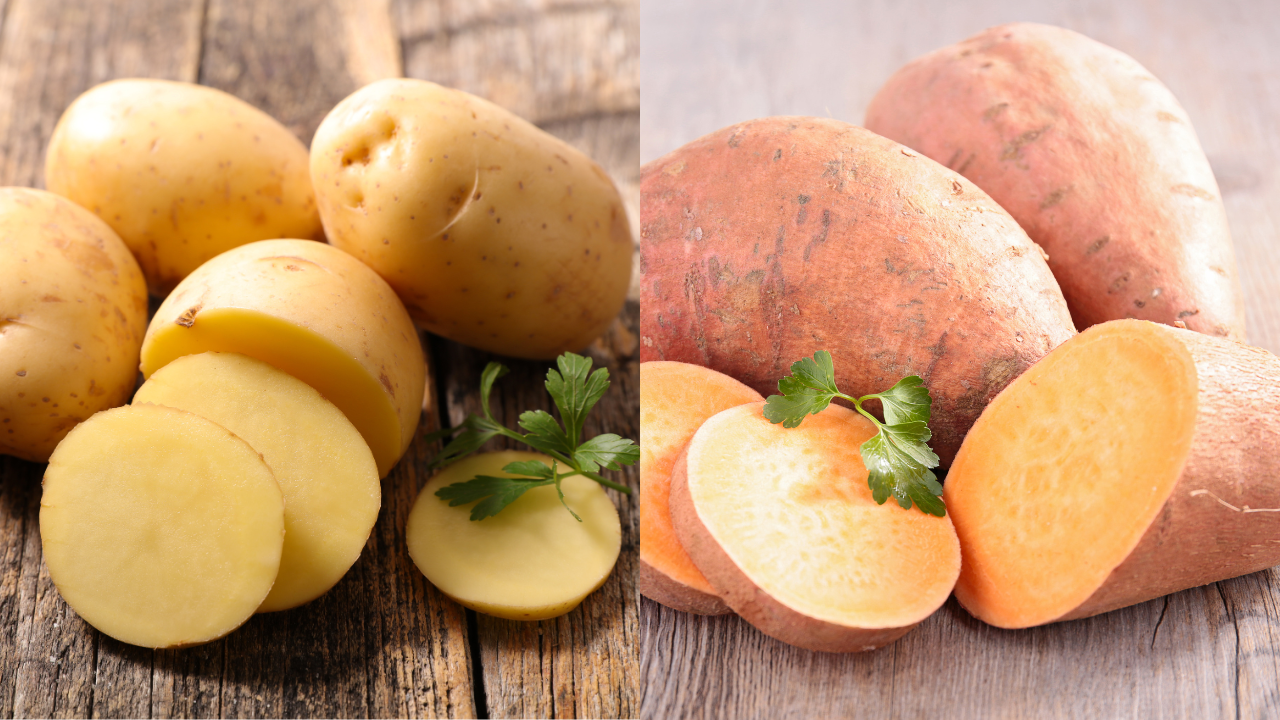
In the epic showdown between sweet potatoes and regular potatoes, it's more than just a matter of taste. These humble root vegetables have sparked a culinary rivalry that's been sizzling for ages. But what's the real deal when it comes to their nutritional punch?
Let's peel back the layers and uncover the truth. First up, sweet potatoes. These vibrant orange tubers often steal the spotlight with their natural sweetness and eye-catching hue. Packed with vitamins and minerals like vitamin A, vitamin C, and potassium, sweet potatoes are a nutritional powerhouse. Plus, they're loaded with fiber, making them a gut-friendly choice for those aiming to stay regular.
But don't count regular potatoes out of the ring just yet. These starchy spuds come in a variety of colors and shapes, from the classic russet to the colorful fingerlings. While they may not boast the same vibrant hue as their sweet counterparts, regular potatoes hold their own in the nutrition department. They're rich in vitamin C, potassium, and B vitamins, particularly if you keep the skin on.
When it comes to calories and carbs, both sweet and regular potatoes are fairly similar, with sweet potatoes edging out slightly in the fiber department. However, the glycemic index, which measures how quickly a food raises blood sugar levels, tends to be lower in sweet potatoes compared to regular potatoes. This makes them a better choice for those watching their blood sugar levels or trying to manage diabetes.
But let's not forget taste and versatility. Sweet potatoes lend themselves well to both sweet and savory dishes, from crispy sweet potato fries to creamy sweet potato pie. Regular potatoes, on the other hand, are the ultimate comfort food, whether mashed, roasted, or turned into fluffy baked potatoes.
In the end, the winner of this culinary clash depends on your personal preferences and nutritional needs. If you're looking for a sweeter, vitamin-rich option with a lower glycemic index, sweet potatoes might be your go-to. But if you're craving classic comfort with a side of potassium and vitamin C, regular potatoes have got you covered.
So, whether you're Team Sweet or Team Regular, there's no denying that both tubers have earned their rightful place in the kitchen spotlight. It's time to embrace the delicious diversity of root vegetables and let your taste buds be the judge.
Calories and Macronutrients When it comes to counting calories and keeping an eye on macronutrients, both sweet potatoes and regular potatoes offer a wallet-friendly option for your diet plan. Let's break down the numbers a bit further.
Picture this: a medium-sized sweet potato clocks in at around 112 calories. That's about the same as a small apple or a handful of almonds. Now, shift your gaze to a similar-sized regular potato, which sneaks in a tad higher at approximately 168 calories. Still, that's not too shabby considering the satisfying crunch you'll get from munching on these earthy delights.
But it's not just about the calories; let's talk macros. Sweet potatoes and regular potatoes both pack a punch when it comes to essential nutrients. Sweet potatoes bring a healthy dose of fiber to the table, helping to keep your digestion in check and your tummy feeling full. Meanwhile, regular potatoes offer up a starchy goodness that's perfect for replenishing your energy stores after a long day.
Now, let's sprinkle in some SEO magic. If you're on the hunt for low-calorie options that won't leave you feeling deprived, sweet potatoes and regular potatoes are your new best friends. Whether you're whipping up a hearty stew or crafting a crispy side dish, these versatile tubers are sure to satisfy your cravings without breaking the calorie bank.
So, the next time you're planning your meals, don't overlook the humble potato. Whether you opt for the sweetness of a sweet potato or the classic appeal of a regular potato, you're sure to find a delicious and nutritious addition to your plate.
When it comes to macronutrients:
Sweet Potatoes: When it comes to sweet potatoes, there's more than just their vibrant color that makes them stand out. These root veggies have gained quite the reputation for being a healthier alternative to their starchy counterparts. Let's dive into what makes sweet potatoes a nutritional powerhouse.
First off, let's talk carbs. Sweet potatoes boast a lower carbohydrate content compared to regular potatoes, making them a go-to choice for those watching their carb intake. With around 26 grams of carbs per medium-sized tuber, they're a smart option for anyone following a low-carb diet or managing their blood sugar levels.
But it's not just about the carbs. Sweet potatoes also pack a punch when it comes to protein, with about 2 grams per serving. While that might not seem like much, every little bit adds up, especially if you're looking to bump up your protein intake without relying solely on meat or other animal products.
And let's not forget about fat. Sweet potatoes are virtually fat-free, with less than 0.2 grams of fat per serving. This makes them a great choice for anyone looking to keep their fat intake in check or maintain a heart-healthy diet.
Now, let's sprinkle in some SEO magic. If you're searching for a nutritious, low-carb option to add to your meal rotation, sweet potatoes fit the bill. Whether you're roasting them up for a savory side dish or mashing them into a creamy soup, these versatile tubers are sure to satisfy your taste buds and your nutritional needs.
So, the next time you're perusing the produce aisle, don't overlook the humble sweet potato. With its lower carb content, protein-packed goodness, and virtually fat-free profile, it's a winning choice for anyone looking to fuel their body with wholesome, nutritious ingredients.
Regular Potatoes: Regular potatoes, the unsung heroes of the root vegetable world, may not boast the same vibrant colors as their sweet counterparts, but they have a lot to offer in terms of nutrition and versatility. Let's peel back the layers and uncover why regular potatoes deserve a spot on your plate.
First things first, let's talk carbs. Regular potatoes come in slightly higher on the carbohydrate scale compared to sweet potatoes, with around 37 grams per medium-sized spud. But don't let that scare you off. Carbs are your body's main source of energy, and when consumed in moderation, they play a crucial role in keeping you fueled throughout the day.
Now, let's chat about protein. Regular potatoes pack a surprising punch in the protein department, with about 4 grams per serving. While they may not rival a steak in terms of protein content, every little bit counts, especially if you're looking to build and maintain muscle mass or simply feel more satisfied after a meal.
And here's the kicker: fat. Regular potatoes are virtually fat-free, making them a guilt-free option for anyone looking to keep their fat intake in check. Whether you're watching your waistline or prioritizing heart health, regular potatoes are a smart choice for adding bulk and flavor to your meals without tipping the scales in the wrong direction.
Now, let's sprinkle in some SEO magic. If you're on the hunt for a nutritious, budget-friendly option to round out your meals, look no further than regular potatoes. With their moderate carb content, surprising protein punch, and virtually fat-free profile, they're a versatile ingredient that's sure to please even the pickiest eaters.
So, whether you're mashing them into creamy potatoes or tossing them into a hearty stew, regular potatoes deserve a prime spot in your culinary lineup. With their nutritional benefits and endless culinary possibilities, they're a true staple in any kitchen.
Fiber Content When it comes to fiber content, both sweet potatoes and regular potatoes are champions in their own right, but there's a slight difference that could sway your preference.
Let's start with sweet potatoes. These colorful tubers pack a punch when it comes to fiber, offering around 4 grams per medium-sized serving. Fiber is crucial for digestive health, helping to keep things moving smoothly and preventing constipation. Plus, it adds bulk to your diet, which can help you feel fuller for longer and curb those pesky cravings.
Now, let's talk about regular potatoes. While they may not have quite as much fiber as their sweet counterparts, they still hold their own in the gut health department. A medium regular potato serves up about 3 grams of fiber, which is nothing to sneeze at. Like sweet potatoes, regular potatoes can help support a healthy digestive system and keep you feeling satisfied between meals.
So, what's the verdict? While sweet potatoes may have a slight edge when it comes to fiber content, both varieties offer valuable benefits for your gut health. Whether you prefer the sweetness of a sweet potato or the classic appeal of a regular potato, you can rest assured knowing that you're giving your body the fiber it needs to thrive.
In terms of SEO, if you're on the lookout for fiber-rich foods to support your digestive health, both sweet potatoes and regular potatoes fit the bill. With their satisfying crunch and versatile culinary potential, these tubers are a delicious way to boost your fiber intake and keep your gut happy.
Vitamin A When it comes to packing a punch in the vitamin department, sweet potatoes steal the spotlight, especially when it comes to vitamin A. These vibrant tubers are like nature's multivitamin, boasting an impressive 438% of the recommended daily intake (RDI) in just one serving. This nutritional powerhouse status is all thanks to their sky-high beta-carotene content, which your body converts into vitamin A.
Now, let's talk about regular potatoes. While they may be a staple in many kitchens, they fall short in the vitamin A department. In fact, they contain virtually no vitamin A to speak of. But don't let that discourage you from enjoying these versatile spuds; they still have plenty of other nutritional benefits to offer.
So, why is vitamin A so important? Well, it plays a crucial role in maintaining healthy vision, supporting immune function, and promoting proper growth and development. Plus, it's a powerful antioxidant that helps protect your cells from damage caused by harmful free radicals.
In terms of SEO, if you're looking to boost your vitamin A intake, sweet potatoes are the way to go. With their sky-high beta-carotene content and impressive nutritional profile, they're a delicious and nutritious addition to any meal. Whether you're mashing them into creamy sweet potato casserole or roasting them into crispy sweet potato fries, you can't go wrong with these colorful tubers.
Vitamin C supporting your immune system and keeping your skin looking its best, both sweet potatoes and regular potatoes have something to offer in the vitamin C department.
Let's start with sweet potatoes. These colorful tubers are not just packed with vitamin A; they also deliver a solid dose of vitamin C. In fact, a single serving of sweet potato provides about 37% of the recommended daily intake (RDI) of vitamin C. This essential nutrient plays a crucial role in supporting immune function, helping your body fend off colds and infections, and promoting healthy skin by aiding in collagen production.
Now, let's talk about regular potatoes. While they may not be as flashy as their sweet counterparts, regular potatoes still pack a punch when it comes to vitamin C. A serving of regular potato delivers approximately 28% of the RDI of vitamin C. While this is slightly less than sweet potatoes, it's still a significant amount that can help support your immune system and keep your skin glowing.
So, whether you prefer the sweetness of a sweet potato or the classic appeal of a regular potato, you can feel good knowing that you're getting a healthy dose of vitamin C with either choice. Incorporating both varieties into your diet is a delicious way to ensure you're meeting your nutritional needs and supporting your overall health and well-being.
Potassium When it comes to supporting heart health and keeping your muscles functioning properly, potassium is a key player. And in this department, regular potatoes come out on top.
Regular potatoes are potassium powerhouses, providing a medium-sized serving with about 26% of the recommended daily intake (RDI) of this essential mineral. Potassium plays a crucial role in maintaining healthy blood pressure levels, supporting proper muscle function, and even helping to regulate fluid balance in the body.
On the other hand, sweet potatoes, while still a nutritious choice, offer slightly less potassium compared to regular potatoes. A medium-sized sweet potato provides around 15% of the RDI of potassium.
So, if you're looking to boost your potassium intake and support your heart and muscles, reaching for regular potatoes might be the way to go. Whether you're mashing them into creamy mashed potatoes or roasting them into crispy potato wedges, regular potatoes are a delicious and nutritious addition to any meal.
Other Nutrients In addition to their well-known nutritional benefits, sweet potatoes and regular potatoes each have their own unique array of nutrients to offer.
Let's start with sweet potatoes. These colorful tubers are not just about vitamin A and vitamin C; they also pack a punch when it comes to other essential minerals. Sweet potatoes boast higher levels of calcium, magnesium, and manganese compared to regular potatoes. Calcium is crucial for strong bones and teeth, while magnesium plays a role in muscle and nerve function. Manganese is important for metabolism and bone health, acting as a cofactor in many enzymes.
Now, let's talk about regular potatoes. While they may not shine quite as brightly in the calcium, magnesium, and manganese departments, they have their own nutritional perks to brag about. Regular potatoes are a better source of iron, an essential mineral that plays a key role in oxygen transport and energy production in the body. They're also rich in vitamin B6, which is important for brain health, metabolism, and immune function.
So, whether you're reaching for sweet potatoes or regular potatoes, you're getting a delicious and nutritious dose of essential nutrients. Incorporating both varieties into your diet is a great way to ensure you're meeting your body's needs and supporting your overall health and well-being.
Understanding the glycemic index (GI) is key when it comes to managing blood sugar levels and overall health. And in the realm of root vegetables, sweet potatoes emerge as the champions for maintaining stable blood sugar levels.
Here's the deal: the glycemic index measures how quickly carbohydrates in foods are converted into glucose and raise blood sugar levels. Foods with a lower GI are digested more slowly, leading to a gradual increase in blood sugar levels, while those with a higher GI cause a more rapid spike.
 Sweet potatoes come out on top in the GI department, boasting a lower GI compared to regular potatoes. This means that they're less likely to cause sudden spikes in blood sugar levels, making them a preferred choice for individuals managing diabetes or anyone seeking sustained energy levels throughout the day.
Sweet potatoes come out on top in the GI department, boasting a lower GI compared to regular potatoes. This means that they're less likely to cause sudden spikes in blood sugar levels, making them a preferred choice for individuals managing diabetes or anyone seeking sustained energy levels throughout the day.
Regular potatoes, while still a nutritious option, tend to have a higher GI compared to sweet potatoes. This means that they can lead to quicker spikes in blood sugar levels, which may not be ideal for those with diabetes or anyone looking to maintain steady energy levels.
Incorporating sweet potatoes into your diet can help support stable blood sugar levels and overall health. Whether you're enjoying them roasted, mashed, or baked, sweet potatoes are a delicious and nutritious addition to any meal. So, next time you're planning your menu, consider swapping out regular potatoes for their lower GI counterpart and reap the benefits of better blood sugar control and sustained energy.
When it comes to fighting off harmful free radicals and supporting overall health, both sweet potatoes and regular potatoes have their own unique arsenal of antioxidants and phytochemicals.
Let's start with sweet potatoes. These vibrant tubers are bursting with antioxidants, especially beta-carotene. Beta-carotene is a precursor to vitamin A and plays a crucial role in promoting eye health and supporting a strong immune system. But that's not all – sweet potatoes also contain anthocyanins, particularly in the purple variety. Anthocyanins are powerful antioxidants known for their anti-inflammatory and anti-carcinogenic properties, helping to protect cells from damage and reduce the risk of chronic diseases.
Now, let's talk about regular potatoes. While they may not be as flashy as their sweet counterparts, regular potatoes still pack a punch when it comes to antioxidants. Particularly those with colored skins and flesh, like red and purple potatoes, contain a variety of antioxidants such as flavonoids and carotenoids. These antioxidants contribute to the health benefits of regular potatoes, helping to combat oxidative stress and inflammation in the body.
So, whether you're enjoying the vibrant hues of sweet potatoes or the earthy tones of regular potatoes, you're reaping the rewards of their antioxidant-rich goodness. Incorporating both varieties into your diet is a delicious and nutritious way to support your overall health and well-being. So, next time you're planning your meals, don't forget to include these nutrient-packed tubers and let their natural goodness shine through.
When it comes to versatility in the kitchen, sweet potatoes and regular potatoes are like culinary chameleons, capable of transforming into a wide array of delicious dishes.
Let's start with sweet potatoes. These vibrant tubers bring a naturally sweet flavor to the table, making them a hit in both savory and sweet creations. Whether you're roasting them to caramelized perfection, mashing them into a creamy side dish, baking them into a pie, or turning them into crispy fries, sweet potatoes lend a touch of sweetness to any recipe.
Now, onto regular potatoes. These humble spuds are the ultimate blank canvas, ready to take on whatever flavors you throw their way. Known for their starchy goodness, regular potatoes can be boiled, baked, fried, or mashed with ease. They serve as the foundation for countless global dishes, from crispy French fries to pillowy gnocchi, and everything in between.
Incorporating both sweet potatoes and regular potatoes into your culinary repertoire opens up a world of possibilities in the kitchen. Whether you're craving comfort food classics or experimenting with new flavors and textures, these versatile tubers have got you covered.
So, whether you're whipping up a cozy shepherd's pie, indulging in sweet potato pie, or diving into a mountain of crispy potato wedges, sweet potatoes and regular potatoes are sure to satisfy your cravings and ignite your culinary creativity.
Summary: In this article, we explored the culinary clash between sweet potatoes and regular potatoes, delving into their nutritional benefits, flavor profiles, and culinary versatility. We discovered that while both tubers offer valuable nutrients like fiber, vitamins, and minerals, they each have their own unique advantages. Sweet potatoes shine with their high levels of vitamin A, lower glycemic index, and antioxidant-rich properties, while regular potatoes excel in providing potassium, iron, and vitamin B6. Additionally, we explored their culinary versatility, with sweet potatoes offering a naturally sweet flavor ideal for both savory and sweet dishes, while regular potatoes serve as a versatile base for countless global recipes.
Disclaimer: The views and opinions expressed in this article are those of the author(s) and do not necessarily reflect the official policy or position of DXB News Network. Readers are encouraged to consult with their healthcare provider or a registered dietitian before making any significant changes to their diet based on the information provided in this article. Additionally, while every effort has been made to ensure the accuracy and reliability of the information presented, DXB News Network cannot guarantee the completeness or timeliness of the content. Readers are advised to use their discretion and judgment when interpreting and applying the information provided herein.
#potatoes #sweetpotatoes #nutrition #culinary #healthychoices #diet #fiber #vitamins #minerals #antioxidants #glycemicindex #cooking #recipes #healthyeating #wellness #food #health #kitchen #nutrients #mealplanning #breakingnews #worldnews #headlines #topstories #globalUpdate #dxbnewsnetwork #dxbnews #dxbdnn #dxbnewsnetworkdnn #bestnewschanneldubai #bestnewschannelUAE #bestnewschannelabudhabi #bestnewschannelajman #bestnewschannelofdubai #popularnewschanneldubai

Gene Hackman and wife Betsy Arakawa found dead in New Mexico home; daughter says he was in good health...Read More.

RTA expands Al Rowaiyah Truck Rest Stop, increasing capacity by 338% for safer roads...Read More.
 Meet Shaheer Niazi The Boy Who Broke Isaac Newton's Record at age 16
Meet Shaheer Niazi The Boy Who Broke Isaac Newton's Record at age 16
Breaking Isaac Newton's record at the tender age of 16 with his revolutionary research on electric h
 West Ham increase pressure on Leicester with 2-0 win
West Ham increase pressure on Leicester with 2-0 win
West Ham defeated struggling Leicester City 2-0 as Soucek scored on his 30th birthday, plus an own g
 MBRSC reveals launch details of Etihad-SAT, its first SAR satellite
MBRSC reveals launch details of Etihad-SAT, its first SAR satellite
MBRSC to launch Etihad-SAT, its first SAR satellite, in March 2025 via SpaceX Falcon 9
 Cleveland Clinic Abu Dhabi sees 35% rise in international patients in 2024
Cleveland Clinic Abu Dhabi sees 35% rise in international patients in 2024
The hospital saw more demand for heart, eye, nerve, and kidney care, with patients from Kuwait, Saud
 Michelle Trachtenberg, Buffy the Vampire Slayer Star, Passes Away
Michelle Trachtenberg, Buffy the Vampire Slayer Star, Passes Away
Michelle Trachtenberg, known for Buffy the Vampire Slayer and Gossip Girl, has passed away at 39
Gene Hackman's daughter speaks out on his health before death

Gene Hackman and wife Betsy Arakawa found dead in New Mexico home; daughter says he was in good health
RTA Expands Al Rowaiyah Truck Rest Stop, Increasing Capacity by 338%

RTA expands Al Rowaiyah Truck Rest Stop, increasing capacity by 338% for safer roads
33 Parks Opened in Mohamed Bin Zayed City by Municipalities & Transport Dept

Improved accessibility and facilities will be offered for People of Determination, ensuring everyone can enjoy the parks' various recreational options
Must-Have Packing List for Your Next Adventure

Maximize Your Journey with This Must-Have Packing List for Adventure
How Technology Is Changing the World of Sports

Explore how technology is transforming sports performance and fan engagement
Anger over Greece rail disaster grows as workers strike, protests expected

Two years after Greece's deadliest train crash, nationwide strikes and protests are held to mark the anniversary
Etihad Airways and Air Europa to Strengthen Strategic Partnership

Etihad Airways and Air Europa to enhance services with a strategic partnership
Top Sports and Athletes Making Headlines in 2025

Exciting sports moments and rising stars dominating 2025
Suicide blast at Taliban religious school in Khyber Pakhtunkhwa kills 5, injures dozens

A bomb blast at a pro-Taliban seminary mosque in northwestern Pakistan kills five and injures many, just before Ramzan
Manchester City Keeps Top Spot as World's Most Valuable Team

Manchester City stays top, with 5 English clubs in the top 10, per Transfermarkt
3001E, 30 Floor, Aspin Commercial Tower, Sheikh Zayed Road, Dubai, UAE
+971 52 602 2429
info@dxbnewsnetwork.com
© DNN. All Rights Reserved.